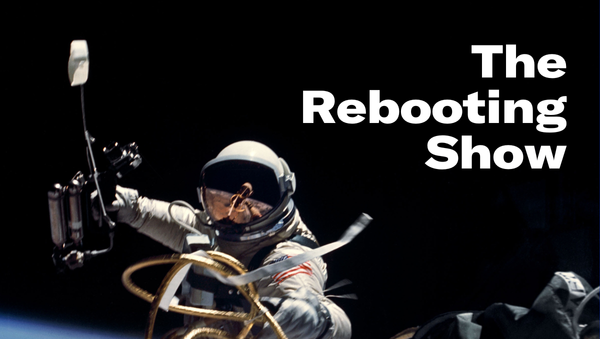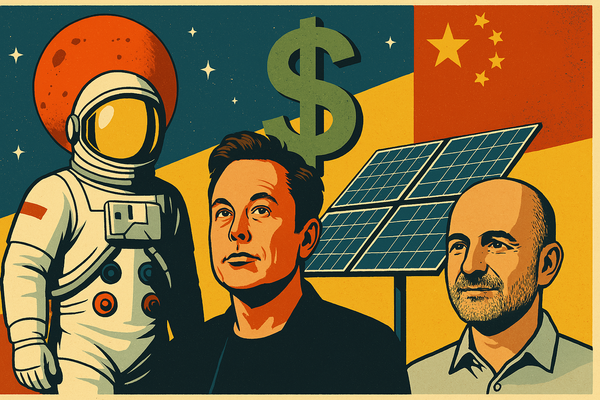Platform issues
Building a business around a platform or a platform around a business

This is the first issue with member-only content. I'm going to experiment with the ratio. Sign up for a membership for access to all content, regular community events like live podcasts and expert workshops and more. Take it from Aging Media founder John Yedniak: Excited to finally pay @bmorrissey for all his insights — and more at the Rebooting. Proud to support friends and people building great media businesses even more."
In today’s issue:
- Media’s extinction event
- The Forbes model
- Expertise
- For members: Why individual publishers need to decide if they’re building a business around a platform, or a platform around a business
Media’s extinction event. The New Yorker’s Clare Malone weighed in on the chaos of the media industry and interviewed me. One part that made it into the piece related to the blame game. I told Clare that in my view, many of the issues that have come to a head stretch back to the origins of the commercial internet.
We all like to point fingers, and there were undoubtedly countless mistakes made by out-to-lunch executives. Yet the current tumult is well beyond that and speaks to structural shifts in how information and entertainment are created, distributed and monetized. More changes are coming as search, the backbone of digital publishing, undergoes an extreme AI makeover. This is going to be the topic of our next episode of People vs Algorithms, as we discuss a new internet in which seeking is replaced by fetching.
Publishing’s pivot to events. Forbes is a good Rorschach test for the state of the publishing business. Some roll-their-eyes at the autoplay and the thousands of 30 Under 30 honorees still on the loose, but a version of the Forbes playbook is being run across many legacy brands.
What Forbes understood earlier than most is that its days of deriving value from its publishing had mostly passed, and it had moved instead into a phase where publishing was just one spoke off the brand, alongside events, honorifics, licensing and awards. This is the future for many magazine brands. Consider Sports Illustrated, which has been endlessly eulogized only to put on a big Super Bowl party in Las Vegas that featured the Chainsmokers and was sponsored by Captain Morgan.
The pivot to expertise. The era of the generalist is mostly over. Medium CEO Tony Stubblebine made some direct points on the shortcomings of a lot of professional media that lacks expertise in subject areas.
“When you bring in a bunch of journalists, it goes against what makes blogging great — that you get to hear personal experiences rather than reported experiences. And the economics just didn’t work at all because it’s expensive to write about things that you don’t already know. That’s why journalists have to be paid a lot to get a high quality piece up. The reporting is really time intensive.”
It’s easy to dismiss the criticism coming from a company that’s pivoted several times. The Information Space is vast enough that practitioner content will jostle with reported articles.
Not all hope is lost. I want to highlight some of the progress being made in building new models.
- I’m very glad to see my longtime friend Keith Pepper making progress with Rough Draft Atlanta. Local is poised for a rebound, and it’s not enough to bet on benevolent billionaires (benevolence is rarely a key attribute to accumulating obscene wealth) or non-profit models.
- Slate, which I subscribed to in the late 1990s to get an umbrella, had a good year, although I agree with Rafat that more specifics on its numbers would be nice.
- 404 Media is part of a coming wave of artisanal independent publications that find niche communities and see what they care about, what they’re happy and excited about, and what they’re really upset about.”
Platform questions
One of the biggest shifts in media is from institutions to individuals. This kind of intense fragmentation inevitably increases the value of platforms and networks that can then organize distribution, provide the needed publishing tools and pathways to monetization.
For an independent publisher – I try to avoid using “creator” because it’s associated with a certain type of publisher – the fork in the road is whether to build a business on a platform or a platform around a business. For most, the answer is a no-brainer. A platform that can abstract all the needed functions of media – creation, distribution, monetization – is worth the tradeoff of loss of control, hewing to the platform’s requirements and even preferred business model. A minority will find it better to go their own way, even with the headaches of handling various product requirements on their own and losing distribution via recommendation algorithms.
I found myself in that situation on Substack. I initially viewed Substack as a simple publishing tool when I started The Rebooting in October 2020. It didn’t make sense at the time to construct a publishing platform without understanding what the product would become. Better to focus on gaining product-market fit and dealing with the shortcomings in using a one-size-fits-all product.




